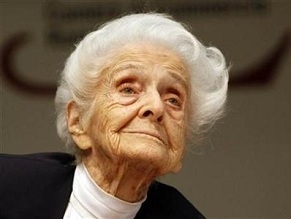|
World Jewish News

Italian Prime Minister Mario Monti paid tribute to Rita Levi-Montalcini for having honoured her country in battling “for life in defending the values in which she believed”.
|
Italian PM honours ‘charismatic and tenacious’ Jewish Nobel Prize winner Levi-Montalcini who died at 103
03.01.2013, Jews and Society Tributes poured in for the late Italian-Jewish Nobel scientist Rita Levi-Montalcini, who died in the Italian capital aged 103 Sunday, as Italian Prime Minister Mario Monti commended her for having honoured her country in battling “for life in defending the values in which she believed”.
One of Italy’s pre-eminent scientists, she earned the title of “Lady of the Cells” for having fought through anti-Semitic persecution and the Nazi invasion to later be awarded the esteemed Nobel Prize for Medicine in 1986 for championing a series of groundbreaking research projects into tumours, developmental malformations and and senile dementia. Working well into her retirement years, three years ago she declared that “at 100, I have a mind that is superior — thanks to experience — than when I was 20”.
Among the dignitaries racing to honour her numerous achievements were Rome Mayor Gianni Alemanno, who, in confirming her death, described it as a great loss “for all humanity”. He further commended her as someone who encompassed “civic conscience, culture and the spirit of research of our time”.
Levi-Montalcini, who was attributed a life senatorship of Italy in 2001 was born to a Jewish family in the northern city of Turin in 1909, defying her father to pursue medical and surgical studies at the city’s university, graduating in 1936m three years prior to the outbreak of WWII. After obtaining a graduate position as a research assistant in neurobiology, she was later forced out of the role in 1938, Italy’s Fascist legislation prevented Jews from attending university or holding significant positions.
Choosing to stay in Italy as war broke out, she established her own home laboratory in which she began extensive studies of chicken embryos, which helped in her later significant findings on cell and organ growth. Following Nazi invasion of Italy in 1943, her family fled to Florence where they remained underground for the remaining two years of the war. Following Allied liberation of the city, Levi-Montalcini accepted an invitation to the US in 1947, where she stayed for 20 years, eventually adopting dual citizenship. It was during this period that she made the initial discoveries that led to her tumour research that earned her the Nobel Prize.
The Prime Minister greeted news of the death of the “charismatic and tenacious woman” Sunday, honouring her achievements in “giving young people, especially women, the opportunity to train and to create a class of women to play a central role in the scientific and social life of their country”.
Paraphrasing Levi-Montalcini’s own words, he added that “humanity is made up of men and women and must be represented by both sexes", expressing his hopes that her legacy would remain in the minds of all Italians for generations to come.
EJP
|
|
